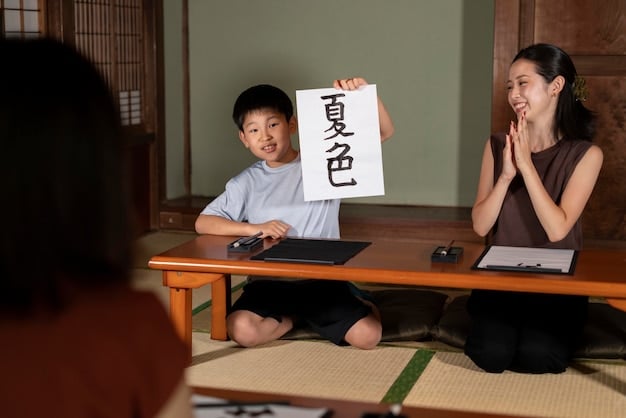Decoding Japanese Drama Slang: Common Phrases and Expressions

Japanese drama slang encompasses a unique set of phrases and expressions that enhance the viewing experience by providing cultural context and nuances often missed in translation.
Want to deepen your appreciation for Japanese dramas? Understanding common slang used in J-dramas will not only enhance your comprehension but also provide insights into Japanese culture and humor. This guide helps you decode Japanese drama slang, making your viewing experience richer and more authentic.
Why Learn Japanese Drama Slang?
Learning Japanese drama slang goes beyond mere language acquisition. It’s about connecting with the cultural context and understanding the humor, emotions, and social dynamics portrayed in J-dramas. By familiarizing yourself with these expressions, you can appreciate the subtleties that subtitles often miss.
Understanding slang can also bridge the gap between formal language learning and real-life conversations. Japanese dramas offer a glimpse into how people actually speak, making your language skills more practical and relevant.

Enhancing Comprehension and Cultural Insight
Slang terms often carry cultural nuances that formal language lessons don’t cover. For example, certain phrases might be used to express sarcasm, affection, or disagreement in uniquely Japanese ways. Recognizing these subtleties allows you to engage with the drama on a deeper level, appreciating the cultural context and social dynamics at play.
- Using slang can lead to a more natural understanding of conversations.
- Cultural insight increases as you become more familiar with slang terms.
- You may also learn about Japanese humor and how it’s expressed through language.
Ultimately, learning slang transforms the viewing experience from passive observation to active engagement, making it more enjoyable and rewarding.
Essential Japanese Drama Slang Terms
Now, let’s dive into some essential slang terms commonly heard in Japanese dramas. These phrases cover a range of emotions, situations, and relationships, providing a solid foundation for understanding informal conversations and humorous exchanges.
By learning these terms, you’ll be better equipped to catch nuances and cultural references, enhancing your overall viewing experience.
Common Phrases Expressing Emotion
Japanese dramas are known for their expressive portrayal of emotions. From heartwarming joy to heart-wrenching sorrow, mastering these common emotional phrases will help you connect with the characters on a deeper level.
- マジ (Maji): “Seriously?” or “Really?” – An expression of surprise or disbelief.
- ヤバイ (Yabai): “Awesome,” “terrible,” or “dangerous” depending on context. This versatile term covers a wide range of intense emotions.
- ムカつく (Mukatsuku): “Annoying” or “Infuriating.”
By recognizing these emotional cues, you can better grasp the underlying feelings of the characters and the dynamics of their interactions. Embrace the emotional journey and let these phrases guide you through the highs and lows of the drama.
Slang for Relationships and Interactions
Understanding relationship dynamics in Japanese dramas is crucial for grasping the storyline. Slang terms related to interactions and relationships offer insights into how characters perceive each other and navigate social situations.
These phrases can add depth to your understanding of character motivations and the complexities of human connections within the drama.
Terms Related to Friendship and Romance
Friendship and romance are central themes in many J-dramas. Learning these slang terms will help you navigate the subtle nuances of these relationships and understand the characters’ feelings and intentions.
- ダチ (Dachi): “Friend” – A casual term for a close friend.
- カレ (Kare): “Boyfriend”.
- カノジョ (Kanojo): “Girlfriend”.
By recognizing these terms, you’ll gain a clearer understanding of the emotional bonds and social connections that drive the narrative forward.
Slang Used in Specific Scenarios
Japanese drama slang often varies depending on the setting and situation. Terms used in school dramas might differ from those used in workplace dramas. Recognizing these contextual variations enhances your overall understanding.
By familiarizing yourself with slang specific to different scenarios, you can better interpret the conversations and dynamics within the drama.

School Drama Slang
School dramas are a popular genre in Japan, depicting the lives and interactions of students. These dramas often feature slang terms that reflect the youthful energy and social dynamics of the school environment.
For example, students might use terms to describe popular classmates, express excitement about events, or navigate the complexities of teenage friendships and rivalries.
- サボる (Saboru): “To skip class”.
- イケメン (Ikemen): “Good-looking guy”.
- キモい (Kimoi): “Gross” or “Creepy”.
Understanding these terms will help you immerse yourself in the world of Japanese high school life and connect with the characters’ experiences.
Tips for Learning and Using Japanese Drama Slang
Learning Japanese drama slang can be both fun and rewarding. Here are some tips to help you effectively learn and use these expressions.
From active listening to practicing in context, these strategies will help you integrate slang into your vocabulary and improve your overall language skills.
Active Listening and Note-Taking
Active listening is essential for learning slang. Pay attention to how characters use these phrases in different contexts and try to understand the nuances of their meaning. Take notes on new terms and their definitions, along with examples of how they’re used.
- Watch dramas with subtitles and compare the translated meaning with the original slang term.
- Listen carefully to the pronunciation and intonation of the words.
- Write down the context in which you heard the slang term to better understand its usage.
By actively engaging with the language and taking detailed notes, you’ll accelerate your learning and improve your comprehension.
Resources for Learning Japanese Slang
Numerous resources can help you learn Japanese slang, from online dictionaries to language exchange partners. These resources provide valuable support and opportunities for practice.
By utilizing these tools, you can expand your knowledge of slang and improve your overall fluency.
Online Dictionaries and Language Exchange Apps
Online dictionaries like Jisho.org and Weblio.jp are excellent resources for looking up slang terms and understanding their meanings. Language exchange apps like HelloTalk and Tandem connect you with native speakers who can help you practice using slang in real conversations.
- Use online dictionaries to find definitions and examples of slang terms.
- Join language exchange apps to connect with native speakers and practice using slang.
- Watch Japanese dramas with friends who speak Japanese and ask them about slang terms you don’t understand.
By combining these resources, you’ll have a well-rounded approach to learning and mastering Japanese slang.
The Evolution of Japanese Drama Slang
Like any language, Japanese slang is constantly evolving, with new terms emerging and old ones fading away. Staying up-to-date with the latest trends can enhance your understanding of contemporary Japanese culture.
By keeping abreast of these changes, you’ll be able to engage with Japanese dramas and real-life conversations more effectively.
Keeping Up with Trends
To stay current with the latest trends in Japanese slang, follow popular Japanese dramas, social media accounts, and online forums. Pay attention to new phrases being used by younger generations and how they’re incorporating them into their everyday conversations.
- “Net lingo” is a good place to find modern expressions.
- Listen to Japanese music.
- Read posts and columns from japanese artists.
| Key Point | Brief Description |
|---|---|
| 🎭 Essential Phrases | Understanding common slang enhances comprehension and cultural insight. |
| 🗣️ Relationship Slang | Terms like “dachi,” “kare,” and “kanojo” explain friendships and romances. |
| 🏫 School Slang | Phrases like “saboru” and “ikemen” show student life in dramas. |
| 📚 Learning Tips | Active listening and studying new expressions in context. |
FAQ: Japanese Drama Slang
▼
Learning slang provides cultural context and nuances that formal language lessons often miss, enhancing your comprehension of character interactions and unspoken meanings. It also brings you closer to how real people communicate.
▼
Common terms include "Maji," which means "Seriously?" or "Really?," and "Yabai," which can indicate something awesome or terrible depending on the context. These phrases capture immediate emotional reactions.
▼
Slang often conveys emotions and attitudes in ways that formal language cannot. Recognizing these expressions allows you to better understand the underlying feelings and motivations of characters.
▼
Online dictionaries like Jisho.org and Weblio.jp are great resources. Language exchange apps like HelloTalk and Tandem connect you with native speakers who can help explain context and usage.
▼
Like any language, Japanese slang evolves. Keeping up with trends via dramas, social media, and language exchange helps you stay current. Younger generations often create new slang, affecting wider adoption.
Conclusion
By understanding and incorporating Japanese drama slang into your vocabulary, you not only enhance your comprehension of J-dramas but also gain a deeper appreciation for Japanese culture and language. Use the tips and resources provided to immerse yourself in the world of Japanese dramas, and enjoy the rewarding journey of learning and discovery.





